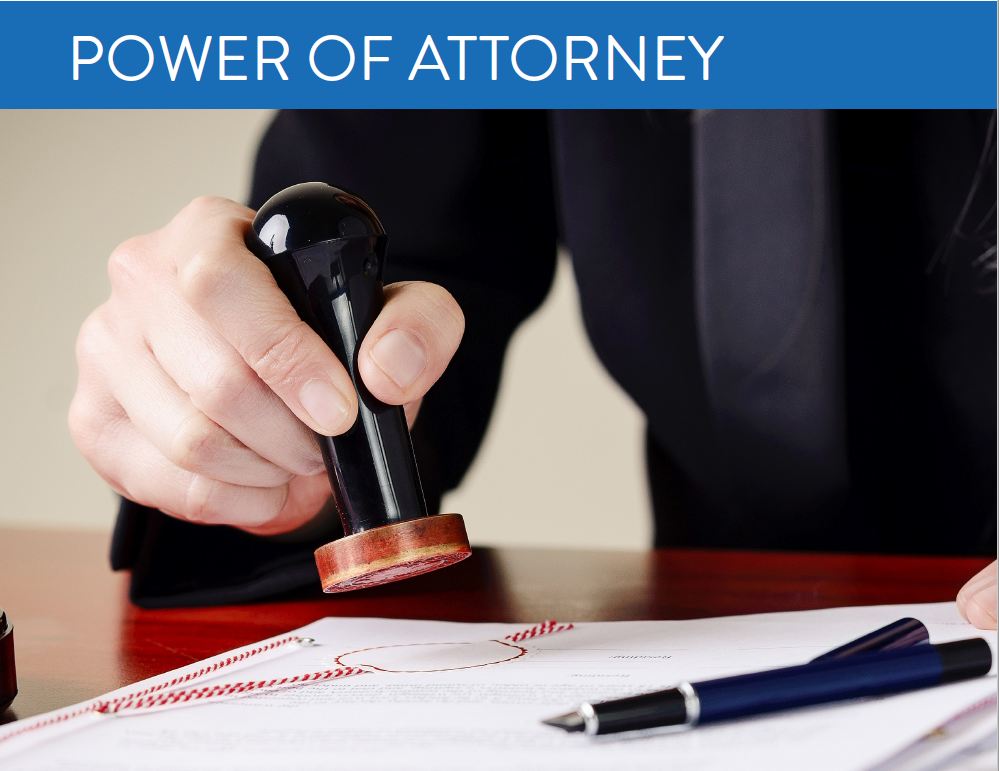Many people assume that if they become incapable of dealing with their own affairs, either through loss of mental or physical capacity, that their spouse/civil partner, or closest family member will automatically be able to act on their behalf. Unfortunately, this is not the case.
Unless there is a Power of Attorney set up in advance, no one has an automatic authority to make decisions about your life if you lose the ability to make decisions for yourself.
What is a Power of Attorney?
A Power of Attorney is a written document giving someone else authority to take actions or make decisions on your behalf if you become unable to do so yourself.
There are three different types of Power of Attorney:
1. General Power of Attorney
Usually created for a set amount of time or for a specific matter i.e. if you are out of the country for a period of time.
2. Continuing Power of Attorney
Allows your Attorney to look after your financial affairs and property. This may be granted with the intention of taking effect immediately or in the event that you become incapable of handling matters yourself.
3. Welfare Power of Attorney
Enables your Attorney to make decisions about your health and welfare, which includes making decisions on medical matters, your personal appearance, and diet. These powers cannot be exercised until you are no longer capable of making these decisions yourself.
Accidents and illnesses can happen to anyone at any time.
Frequently Asked Questions
Our answers to some of the most frequently asked questions about Powers of Attorney follow: –
What does incapable mean?
Your capacity can diminish over time due to a progressive illness or suddenly as a result of an accident or illness. A registered medical practitioner will be able to say whether you are incapable or not.
Is a Power of Attorney just for older people?
No, no one likes to think that they may not be able to look after their own affairs but accidents and illness can happen to anyone at any time.
What if I have been diagnosed with Alzheimer’s disease or dementia?
Just because you have been diagnosed with Alzheimer’s disease or Dementia, does not necessarily mean you lose capacity immediately. Mental capacity can change in the short and long term and even on a day-to-day basis. It will depend on your diagnosis and your capacity at the time you are considering a Power of Attorney.
What would happen if I do not have a Power of Attorney?
If you do not have a Power of Attorney and become ill or lose capacity, your family or loved ones may have to apply to the Court for a Guardianship Order. This process generally takes a long time, will be expensive, and can be an extremely stressful and emotional experience for everyone involved.
Importantly, the person appointed by the Court to be your Guardian may not be who you yourself would have chosen as your Attorney. It is also a more arduous task being appointed as Guardian rather than an Attorney. The Guardian is subject to more stringent scrutiny from the Office of the Public Guardian (OPG) for Scotland and is required to submit a management plan and annual accounts relating to your affairs. This adds greatly to their responsibility and the costs to your estate which can easily be avoided by granting a Power of Attorney while you have full capacity.
Who can be an Attorney?
You can appoint anyone (it is a good idea to have more than one person) over the age of 16 years old to be responsible for your affairs. This could be your spouse / civil partner, your children, a family member, a close friend, or a professional such as an accountant or a combination of any of these people.
You should choose someone who you are confident will act reliably on your behalf and take into account your views and wishes.
Do I need to appoint the same people to be my Continuing and Welfare Attorneys?
No, you can appoint someone to deal with your financial matters and someone different to deal with your personal welfare. However, you should be aware that someone who has been declared bankrupt cannot be appointed a Continuing Attorney.
Can my Attorney act before I become incapable?
Yes, if the Power of Attorney has been registered with the OPG then your Attorney can help you with your financial and property affairs if you ask them to do so. However, they cannot make decisions about your welfare until you are no longer able to make those decisions for yourself.
What happens if my Attorney becomes unable to act on my behalf?
If your Attorney dies or otherwise becomes unable to act for you then you will need to draw up a new Power of Attorney, if you are still able to do so. It is therefore a good idea to have more than one Attorney or even a substitute Attorney to step in if your Attorney can no longer do things for you.
You should choose someone who you are confident will act reliably on your behalf and take into account your views and wishes.
What happens if I decide I want to cancel my Power of Attorney or change my Attorney?
You can cancel/amend your Power of Attorney or even change your Attorney at any time as long as you have the capacity to do so, even if the Power of Attorney has been registered with the OPG.
How or where would I get a Power of Attorney?
Innes Johnston’s Private Client department can help. Our experienced solicitors will be happy to discuss all of the available options and help you think about the type of decisions that might need to be made in the future. They will also ensure that your wishes are met and that the Attorney’s responsibilities are made clear.
Our experienced solicitors will be happy to discuss all the available options and answer any of your own questions on the subject.
WE ARE HERE TO HELP!
If you would like to meet with one of our solicitors to get some further advice on this matter, please contact one of our offices on:
Kirkcaldy 01592 263455 | Glenrothes 01592 757114 | Leven 01333 429320



